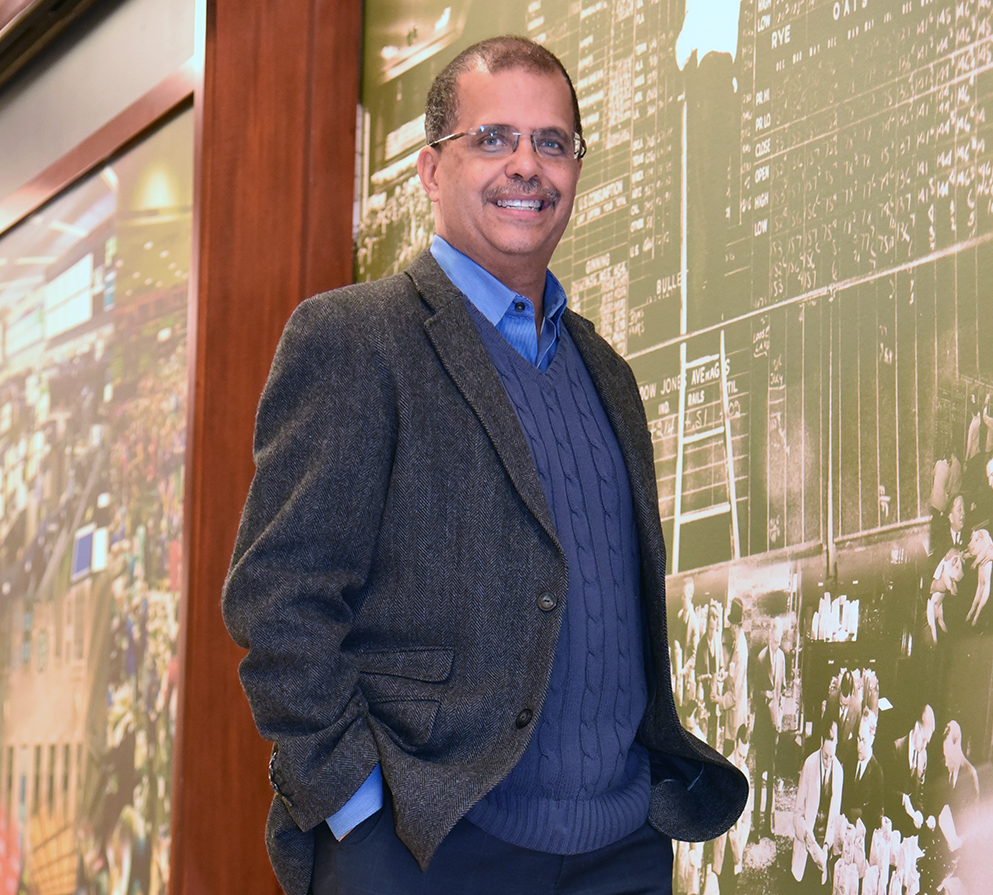 Professor of Management & Entrepreneurship William "Marty" Martin | Photo by Kathy Hillegonds
Professor of Management & Entrepreneurship William "Marty" Martin | Photo by Kathy HillegondsProfessor of Management & Entrepreneurship William “Marty” Martin joined the first cohort of the
Research and Innovation Leadership Fellows Program at DePaul University last March. Organized by the Office of the Provost, the fellowship challenges Martin to focus for one year on cultivating innovation through university and community partnerships. His efforts so far have involved collaborating with internal and community partners on fostering health care innovation and supporting entrepreneurship and the commercialization of inventions aimed at positively affecting society.
A licensed clinical psychologist,
Martin researches business ethics, healthcare management, disruptive behavior and entrepreneurship. He’s the author of “Taming Disruptive Behavior,” a workplace guide for healthcare managers, and “The Inner World of Money: Taking Control of Financial Decisions and Behavior.” He’s also a certified sleep coach, has managed health clinic human resources and served as a psychologist in the Behavioral Medicine Branch at the National Institute for Occupational Safety and Health.
Below, Martin discusses the details of his research and its ultimate impact on DePaul as an agent for social good.
Tell us about the Research and Innovation Leadership Fellows Program. What have you worked on so far?
Since January 2021, my project has focused on technology transfer, commercialization and social impact. Over the past nine months, I have been collaborating with partners ranging from the Chicago-based Sinai Urban Health Institute to the Prysm Institute (an international virtual accelerator for life science industries), focusing on increasing the engagement of underrepresented minorities and women in health, life sciences and technology entrepreneurship.
My work as a fellow has validated my “gut instinct” about the innovation that exists among our faculty and staff and the continued focus on collaboration across colleges and schools. Examples of this innovative collaboration are projects related to applying virtual reality technology to designing new courses and investigating new degree offerings.
One of my major areas of focus has been working with nine awardees from
DePaul’s Academic Growth and Innovation Fund (AGIF) to guide them and support them in realizing the aims of their projects. In addition to coaching, I have worked with approximately 10 other AGIF awardees as part of the Office of Research Services’ (ORS) Lunch n Learn series, Innovation Day in 2021, and other committees working on initiatives such as the DePaul/Rosalind Franklin University alliance.
How have you worked with the AGIF awardees?
This summer I launched a pilot “coaching” program to help realize the outcome of their (AGIF) projects. The aim of the pilot coaching program is to offer AGIF awardees the opportunity to meet with me at least four times per year to support them in achieving the goals of their AGIF projects. A unique focus of this coaching program is to offer guidance and connections so that AGIF awardees (if they are interested) can move through the three stages of AGIF funding, including the idea/conception stage, the prototype/working model stage and the institutional adoption and commercialization stage.
Another aspect of AGIF is that these projects at the last stage should result in institutional adoption and/or commercialization. For example, Matthew Raggas, an associate professor in DePaul’s College of Communication, received an AGIF grant which he used to create the new Master of Science in Professional Communication at DePaul. Another example is that some of these projects resulted in the awardee being able to "pilot test" a project which was later funded by agencies such as the National Science Foundation.
How do you think the work you have done so far in your fellowship has impacted students?
The work done to date has directly impacted three students. Two undergraduate students served in the role of undergraduate research assistants. One of the students worked on a project conducting an industry map of life sciences/biotechnology incubators/accelerators to learn what others are doing in this space to guide DePaul as we begin LaunchPad, which is a partnership between DePaul and the Prysm Institute to advance the number of underrepresented minorities and women pursuing entrepreneurship in life sciences, biotechnology, healthcare and health technology.
Another undergraduate student conducted customer discovery interviews to determine how students schedule course schedules, studying, homework and exam times based on what they perceive to be their "best time of day." This project is based on the circadian rhythm (a biological process that regulates the sleep–wake cycle) and long-standing evidence that academic performance is in part dependent on when to do specific tasks. For example, tasks demanding focus, concentration and problem solving are best done in the mornings before noon.
The ultimate aim of this project is to contribute to applied scholarship on circadian biology and academic performance and to develop an app for students to be able to identify their chronotype, identify optimal times of day for specific academic tasks, and then make personalized recommendations of when students should take courses, study, do homework and take exams.
The final project is an entrepreneurship intern supported by the
Coleman Entrepreneurship Center who is working at the Sinai Urban Health Institute to scale community health worker training nationally as the demand for community health workers increases across the nation. This is a graduate student studying marketing at DePaul.
What have you enjoyed the most about working within the fellowship?
For me, the most enjoyable aspect is helping individuals realize their research, innovation and commercialization ambitions. For instance, when coaching AGIF awardees, if you can feel the positive energy about the possibilities that their creative activities, scholarship and research have on impacting others and DePaul, then this is truly a great feeling. The other enjoyable aspect is developing and cultivating relationships which result in coming together to pursue opportunities that could not be pursued if it were not for such a partnership.
Learn more about: